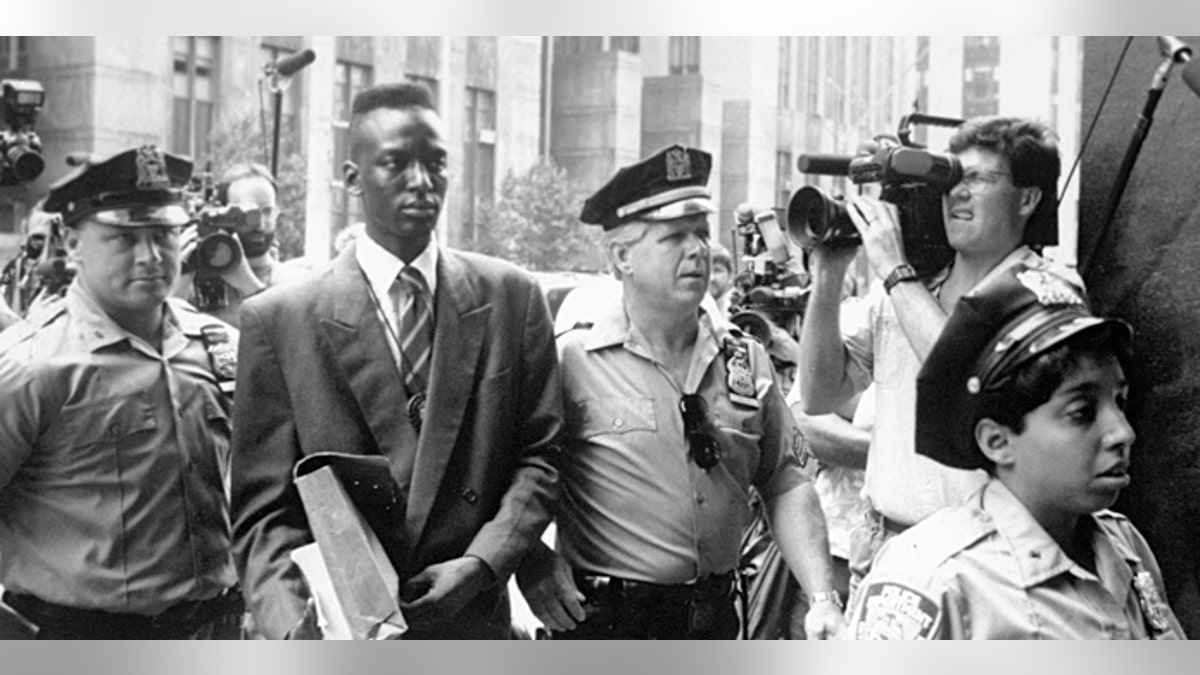
FILE - This 1990 file photo provided by Sundance Selects shows accused rapist Yusef Salaam, second right, being escorted by police in New York in 1990. Salaam is the subject of the documentary, "The Central Park Five," about the 1989 case of five black and Latino teenagers who were convicted of raping a white woman in Central Park. A city official said Friday, June 20, 2014 that New York City has agreed to a $40 million settlement in a civil rights lawsuit filed against police and prosecutors by Salaam and four co-defendants exonerated in the notorious case of a jogger attacked in Central Park in 1989. (AP Photo/Sundance Selects, NY Daily News, File)
NEW YORK – All but closing the books on one of the most sensational crime cases in New York history, the city has agreed to a $40 million settlement with five men who were falsely convicted in the vicious 1989 rape and beating of a Central Park jogger, a city official said Friday.
The official had direct knowledge of the agreement but wasn't allowed to discuss it publicly and spoke to The Associated Press on condition of anonymity. The deal still needs the approval of the city comptroller and a federal judge.
The five black and Hispanic defendants were found guilty as teenagers in 1990 in the attack on a white woman who had gone for a run in the park.
They served anywhere from six to 13 years in prison before their convictions were thrown out in 2002 when evidence connected someone else to the crime.
More than a decade ago, they brought a $250 million civil rights lawsuit against police and prosecutors.
Civil rights activist the Rev. Al Sharpton said in a statement that the proposed settlement signifies "a monumental victory" for the men and their families.
"It is also a victory for those in the community that stood with them from day one and believed in their innocence in this case," Sharpton said. "As supporters, we were viciously attacked for standing with them, but we were on the right side of history."
The attack on 28-year-old investment banker Trisha Meili was one of the most notorious crimes in New York City history and came to be seen as a lurid symbol of the city's racial and class divide and its rampant crime. It gave rise to the term "wilding" for urban mayhem by marauding teenagers.
When Meili was found in the brush, more than 75 percent of her blood had drained from her body and her skull was smashed. She was in a coma for 12 days, left with permanent damage, and remembers nothing about the attack.
The AP does not usually identify victims of sexual assault, but Meili went public as a motivational speaker and wrote a book.
Raymond Santana and Kevin Richardson, both 14 at the time, Antron McCray and Yusef Salaam, 15, and Korey Wise, 16, were rounded up and arrested. After hours of interrogation, four of them gave confessions on video.
At the trials, their lawyers argued the confessions were coerced. At the time, DNA testing was not sophisticated enough to make or break the case.
In 2002, a re-examination of the case found that DNA on the victim's sock pointed to Matias Reyes, a murderer and serial rapist who confessed that he alone attacked the jogger.
Then-District Attorney Robert Morgenthau stopped short of declaring the five innocent but withdrew all charges and did not seek a retrial. The statute of limitations for charging Reyes had run out; he is serving a life sentence for other crimes.
The case that stood as symbol of urban lawlessness became instead an example of a colossal breakdown in the legal system.
Jonathan C. Moore, a lawyer for the five men, declined to comment, as did a spokeswoman for the city's Law Department.
Andrew G. Celli, a lawyer who took an interest in the case submitted a brief in the litigation, welcomed news of a settlement.
"A settlement this large, this dynamic, will have an impact," he said. "It will cause police and prosecutors to think a bit more carefully about the ramifications of a particular investigation."








































